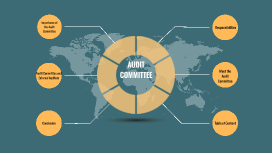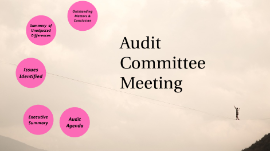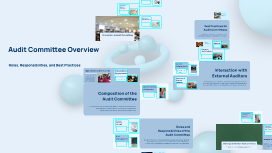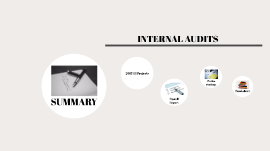Audit Committee
Transcript: Importance in Corporate Governance Audit Committees are vital for upholding the integrity of financial disclosures and ensuring compliance with regulations. Their oversight helps prevent fraud, enhances stakeholder confidence, and ultimately contributes to the overall health of the organization. Overview of Regulatory Framework Audit Committees operate under various regulatory frameworks, including Sarbanes-Oxley Act and international regulations like IFRS. These regulations establish mandatory requirements for the formation, responsibilities, and disclosures of Audit Committees. Performance Evaluation Regular evaluation of the committee's performance is essential for identifying strengths and areas for improvement. This can be achieved through self-assessments, peer reviews, or external evaluations, fostering a culture of accountability and continuous improvement within the committee. Definition of Audit Committee An Audit Committee is a subcommittee of the board of directors responsible for overseeing financial reporting, risk management, and compliance processes. It typically comprises independent directors with expertise in finance and accounting. Best Practices for Audit Committees Introduction to Audit Committees Effective audit committees play a crucial role in ensuring transparency and accountability within organizations. Emphasizing best practices can enhance their functionality, ultimately fostering stronger corporate governance and risk management. Audit Committees play a crucial role in ensuring the integrity of financial reporting and enhancing corporate governance. They serve as a bridge between the board of directors, management, and external auditors, ensuring accountability and transparency in financial practices. Continuous Education Effective Communication Establishing clear channels of communication encourages open dialogue among committee members, management, and external auditors. Regular meetings and timely sharing of information enable the committee to perform its oversight role effectively, ensuring that all stakeholders are aligned in their objectives and concerns. Audit committee members must stay informed about evolving regulations, accounting standards, and best practices through continuous education and training. This may involve attending workshops, seminars, or obtaining relevant certifications to enhance their oversight capabilities. Review of Audit Findings Audit Committee Overview The audit committee conducts a thorough review of annual audit findings, discussing significant issues raised by external auditors. This process includes a focus on recommendations for improvements, risk management, and compliance measures as indicated in the audit report. Auditor Independence Roles, Responsibilities, and Best Practices Appointment and Term Limits Maintaining auditor independence is vital for unbiased opinions in financial reporting. The audit committee monitors relationships and engagements that may impair the auditor's objectivity, ensuring compliance with relevant regulations and ethical standards. Interaction with External Auditors Independence Requirements Committee members are usually appointed by the board of directors, ensuring they align with the organization's governance policies. Term limits may be imposed to ensure fresh perspectives and rotational oversight, enhancing accountability within the committee. Audit Committee members must be independent from the management team. This independence is crucial for unbiased judgment in financial oversight, limiting conflicts of interest that may affect decision-making and ensuring rigorous scrutiny of financial practices. Selection of External Auditors An effective collaboration between the audit committee and external auditors is crucial for enhancing financial integrity and transparency. Understanding the key aspects of this interaction can strengthen corporate governance practices. The audit committee is responsible for selecting external auditors, ensuring they meet predefined criteria of expertise, experience, and independence. Evaluating candidate qualifications and firm reputation is critical in establishing a trustworthy and effective auditing process. Qualifications of Members Members of the Audit Committee should have relevant financial expertise, including accounting or auditing knowledge. At least one member must be a financial expert, familiar with financial statements and the intricacies of financial reporting, ensuring informed oversight of the organization's financial practices. Composition of the Audit Committee The composition of the Audit Committee is critical to its effectiveness. Members must possess specific qualifications and maintain independence to fulfill their responsibilities effectively. Future Trends in Committee Operations Audit committees are expected to leverage technology for enhanced data analysis and reporting. Embracing AI and machine learning can optimize decision-making processes and

















